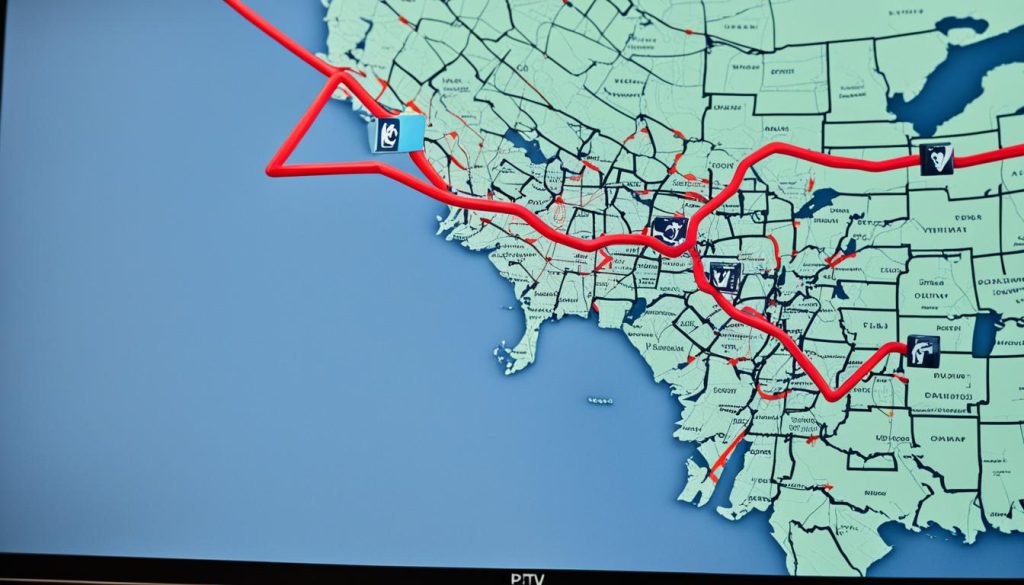The rise of Internet Protocol Television (IPTV) has brought about new challenges in terms of handling regional restrictions. IPTV allows users to access a wide range of television channels and on-demand content delivered via the internet, rather than traditional broadcast or cable methods. However, content providers often impose geographical restrictions on where their content can be viewed, creating obstacles for IPTV users. These restrictions are primarily driven by content licensing agreements and the need to comply with regional laws and regulations. IPTV service providers must navigate these regional restrictions to ensure their users can access the desired content while adhering to licensing terms and legal requirements.
Key Takeaways
- IPTV service providers must comply with geographical restrictions imposed by content providers to avoid legal complications.
- Content licensing agreements play a crucial role in determining the availability and accessibility of content on IPTV platforms.
- The distinction between commercial and residential use is an important consideration for IPTV regional restrictions.
- IPTV service providers employ various geo-blocking techniques to ensure compliance with regional restrictions.
- Public venues offering IPTV services must consider bandwidth requirements, security measures, and diverse content preferences.
Understanding IPTV Regional Restrictions
Content providers often implement IPTV geographical restrictions, also known as geo-blocking, to limit access to their content based on the user’s location. These restrictions are typically enforced through IP address monitoring or other geolocation techniques. IPTV service providers must comply with these geographical restrictions to avoid legal complications and ensure they are not breaching content licensing agreements.
Content Licensing Agreements
Content licensing agreements between IPTV service providers and content creators/owners play a crucial role in determining the availability and accessibility of content. These agreements often specify the regions where the content can be distributed and viewed, as well as the permitted use (e.g., commercial vs. residential use). IPTV service providers must carefully negotiate and adhere to these licensing terms to avoid any legal disputes or content takedowns.
Commercial vs. Residential Use
The distinction between commercial and residential use is an important consideration when it comes to IPTV regional restrictions. Content licenses may differentiate between these two categories, with different terms and conditions applying to each. Public venues, such as cafes, hotels, and airports, are considered commercial spaces and may require specific licensing agreements or additional permissions to broadcast IPTV content, compared to private residential settings.
How does IPTV handle regional restrictions?
IPTV service providers employ various geo-blocking techniques to ensure compliance with regional restrictions. These may include monitoring users’ IP addresses, verifying locations through GPS data, or implementing region-specific content libraries. While these measures help IPTV providers adhere to licensing agreements, users may attempt to bypass geo-blocks through the use of Virtual Private Networks (VPNs) or proxy services. However, the legality and efficacy of these bypass methods can vary depending on the specific IPTV platform and the content being accessed.
Geo-blocking Techniques
IPTV service providers utilise a range of geo-blocking techniques to enforce regional restrictions on their platforms. This may involve closely monitoring users’ IP addresses to determine their geographical location and restricting access to content that is not licensed for their region. Additionally, providers may verify users’ locations through GPS data or other geolocation methods to ensure compliance with content licensing agreements.
VPN and Proxy Bypassing
Some IPTV users may turn to VPN or proxy services in an effort to circumvent regional restrictions and access content that is normally unavailable in their locations. VPNs can mask a user’s IP address and make it appear as if they are accessing the IPTV service from a different geographical region. Proxy services can also provide a similar function, routing the user’s internet traffic through a server in a different location. While these methods may allow users to bypass geo-blocks, their legality and the IPTV provider’s stance on their use can vary significantly.

Considerations for Public Venues
When implementing IPTV in public venues, such as cafes, airports, and hotels, there are additional factors beyond just regional restrictions that service providers must address. Ensuring adequate IPTV bandwidth requirements and prioritising robust security measures are crucial considerations for these public settings. Additionally, catering to the diverse content preferences of patrons is key to delivering a compelling IPTV experience.
Bandwidth Requirements
Public spaces must ensure they have the necessary bandwidth and internet infrastructure to support the increased data demands of IPTV streaming, particularly during peak usage times. Failure to provide adequate bandwidth can result in buffering, interruptions, and a poor overall viewing experience for patrons. IPTV service providers must work closely with venue managers to assess and address the bandwidth requirements to deliver seamless IPTV performance.
Security Measures
Public venues that offer IPTV services must also prioritise security measures to protect their systems from unauthorised access and content piracy. This may involve implementing robust access controls, firewalls, and monitoring systems to prevent malicious actors from disrupting the IPTV service or accessing sensitive information. Maintaining robust security measures is crucial to ensuring the integrity and reliability of the IPTV offering in public settings.
Diverse Content Preferences
Given the diverse nature of the audience in public venues, IPTV service providers must cater to a wide range of content preferences. Venues may need to curate and offer a comprehensive selection of channels, on-demand content, and live events to satisfy the varying interests of their patrons. Maintaining a diverse content library can enhance the overall appeal and engagement of the IPTV service within the public space, catering to the diverse needs and preferences of the audience.
Conclusion
Internet Protocol Television (IPTV) has firmly established itself as a prevalent technology, offering both residential and public settings convenient access to a vast array of television channels and on-demand content. However, the effective handling of regional restrictions remains a crucial aspect that IPTV service providers must address with diligence.
By thoroughly understanding and navigating the complexities of geographical restrictions, content licensing agreements, and the unique requirements of public venues, IPTV providers can ensure their users can access the desired content while scrupulously adhering to legal and licensing requirements. This delicate balance is essential in delivering a seamless and compliant viewing experience for IPTV users.
As the IPTV landscape continues to evolve, the ability to effectively manage regional restrictions will remain a key factor in the success and sustainability of IPTV service providers. By staying vigilant and adapting to the ever-changing landscape, they can continue to offer their customers uninterrupted access to the content they desire, while maintaining compliance with the necessary regulations and licensing agreements.
FAQ
What are the key challenges IPTV providers face in handling regional restrictions?
IPTV providers must navigate geographical restrictions, content licensing agreements, and the distinction between commercial and residential use to ensure users can access desired content while adhering to legal and licensing requirements.
How do content providers implement geographical restrictions on IPTV content?
Content providers often use geo-blocking techniques, such as IP address monitoring and geolocation, to limit access to their content based on the user’s location.
What role do content licensing agreements play in IPTV regional restrictions?
Content licensing agreements between IPTV providers and content creators/owners specify the regions where the content can be distributed and viewed, as well as the permitted use (e.g., residential versus commercial).
How do IPTV service providers ensure compliance with regional restrictions?
IPTV service providers employ various geo-blocking techniques, such as monitoring users’ IP addresses, verifying locations through GPS data, or implementing region-specific content libraries.
Can users bypass IPTV regional restrictions using VPNs or proxy services?
Users may attempt to bypass geo-blocks through the use of Virtual Private Networks (VPNs) or proxy services, but the legality and efficacy of these bypass methods can vary depending on the specific IPTV platform and the content being accessed.
What considerations do public venues need to keep in mind when implementing IPTV?
Public venues must ensure they have adequate bandwidth and internet infrastructure to support IPTV streaming, prioritise security measures to protect their systems, and curate a diverse content library to satisfy the varying interests of their patrons.



